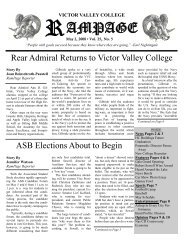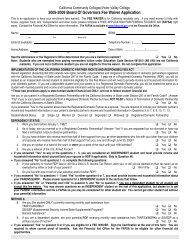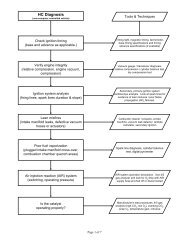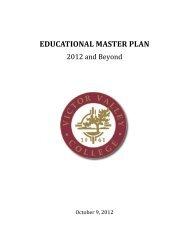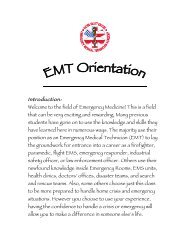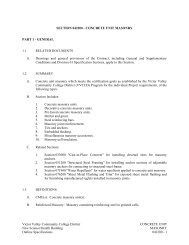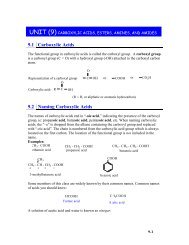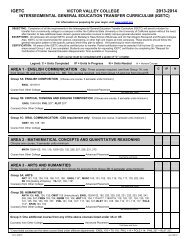Download - Victor Valley College
Download - Victor Valley College
Download - Victor Valley College
Create successful ePaper yourself
Turn your PDF publications into a flip-book with our unique Google optimized e-Paper software.
PROGRAMS / COURSE DESCRIPTION<br />
evolution, ecology, behavior and environmental issues.<br />
The laboratory will include a survey of the morphological<br />
characteristics of various organisms on this planet.<br />
other topics of local interest. Although this course has<br />
no laboratory, some outdoor activities and shortdistance<br />
field trips during class time may be required.<br />
BIOLOGICAL SCIENCE<br />
BIOL H100 GENERAL BIOLOGY HONORS<br />
Units: 4.0 - 48-54 hours lecture and 48-54 hours<br />
laboratory. CSU, UC (No prerequisite)<br />
This is an introductory course for honors students<br />
emphasizing the scientific method, analysis of scientific<br />
data, the use of scientific units, cellular biology, genetics<br />
and heredity, classification and systematics, evolution,<br />
ecology, environmental issues, and current topics in<br />
biology. The laboratory complements the lecture topics<br />
via direct experimentation, simulations, and video,<br />
including a survey of Earth’s biological diversity. Specific<br />
topics will be emphasized through the use of reading<br />
assignments and the preparation of a short research<br />
paper.<br />
BIOL 104 GENERAL BOTANY<br />
Units: 4.0 - 48-54 hours lecture and 48-54 hours<br />
laboratory. CSU, UC. (No prerequisite)<br />
This botany course is for non-biology majors. Topics<br />
include plant anatomy, plant physiology, plant cell<br />
structure, photosynthesis, cell respiration, ecology,<br />
genetics, systematics, and plant evolution. The course<br />
also includes brief introductions to reproduction of<br />
flowering plants, mosses, ferns, and conifers; and<br />
sections on field botany and plant identification.<br />
Emphasis will be placed on use of the scientific method,<br />
critical thinking, and problem solving skills. Up to two<br />
field trips may be required.<br />
BIOL 107 INTRODUCTION TO HUMAN BIOLOGY<br />
Units: 4.0 - 48-54 hours lecture and 48-54 hours<br />
laboratory. CSU. (No prerequisite)<br />
An introduction to biological principles with a human<br />
perspective. Emphasis on cellular structure and<br />
function, organ systems, the concept of homeostasis,<br />
adaptation, cellular and population genetics, and the<br />
interaction of the human species with the ecosystem.<br />
BIOL 118 PRINCIPLES OF HEREDITY<br />
Units: 3.0 - 48-54 hours lecture. CSU, UC. (No<br />
prerequisite)<br />
A survey of Mendelian inheritance, quantitative traits,<br />
and population genetics with special emphasis on<br />
human inheritance and family pedigree analysis. Also<br />
includes sections on DNA technology, immune genetics<br />
and genetics of cancer. This course stresses<br />
development of critical thinking and problem solving<br />
skills.<br />
BIOL 120 IDENTIFICATION AND STUDY OF<br />
WILDFLOWERS<br />
Units: 3.0 - 32-36 hours lecture and 48-54 hours<br />
laboratory. CSU. (No prerequisite. Grade Option)<br />
This course employs an evolutionary approach to give<br />
students a working knowledge of plant classification, as<br />
well as an appreciation for the diversity of the flora of<br />
southern California. Students will learn how to use keys<br />
to identify local plant species, learn characteristics of the<br />
most common plant families, and will be able to<br />
describe, identify, and understand some of the<br />
dynamics of local plant communities. Vigorous field<br />
activities are required.<br />
BIOL 126 NATURAL HISTORY OF THE MOJAVE<br />
DESERT<br />
Units: 3.0 - 32-36 hours lecture and 48-54 hours<br />
laboratory. CSU. (No prerequisite. Grade Option.)<br />
This course acquaints students with the unique plants of<br />
the Mojave Desert and their adaptations for survival.<br />
Emphasis is on identification, life history, water<br />
economy, and thermoregulatory mechanisms. Mojave<br />
Desert plant communities, climate, geology, geography,<br />
and history will also be discussed. Local conservation<br />
issues will also be surveyed, with special consideration<br />
of rare and endemic species.<br />
BIOL 114 INTRODUCTION TO ECOLOGY<br />
Units: 3.0 - 48-54 hours lecture. CSU, UC. (No<br />
prerequisite)<br />
The first half of this course covers basic ecological<br />
principles about demography and population growth,<br />
species interactions and food webs, introduction to<br />
photosynthesis and metabolism, and nutrient cycling.<br />
The remainder of the course emphasizes environmental<br />
problems and how they relate to ecological principles.<br />
Topics include global biodiversity and endangered<br />
species, water and air pollution, alternate energy<br />
sources, alternative agriculture and pesticides, and<br />
BIOL 127 IDENTIFICATION AND STUDY OF BIRDS<br />
OF THE MOJAVE DESERT AND ADJACENT<br />
MOUNTAINS<br />
Units: 3.0 - 32-36 hours lecture and 48-54 hours<br />
laboratory. CSU. (No prerequisite. Grade Option.)<br />
Field identification of 75 bird species of the local area.<br />
Includes song and habitat identification, study of birds’<br />
feathers, colors, and their uses. Adaptations of bills,<br />
feet, wings, and bones. Course also covers the food of<br />
birds, their ecological relationships, eggs and nests,<br />
senses and behavior, flight and song. Course touches<br />
briefly on bird migration.<br />
136 2012-2013 <strong>Victor</strong> <strong>Valley</strong> <strong>College</strong> Catalog



